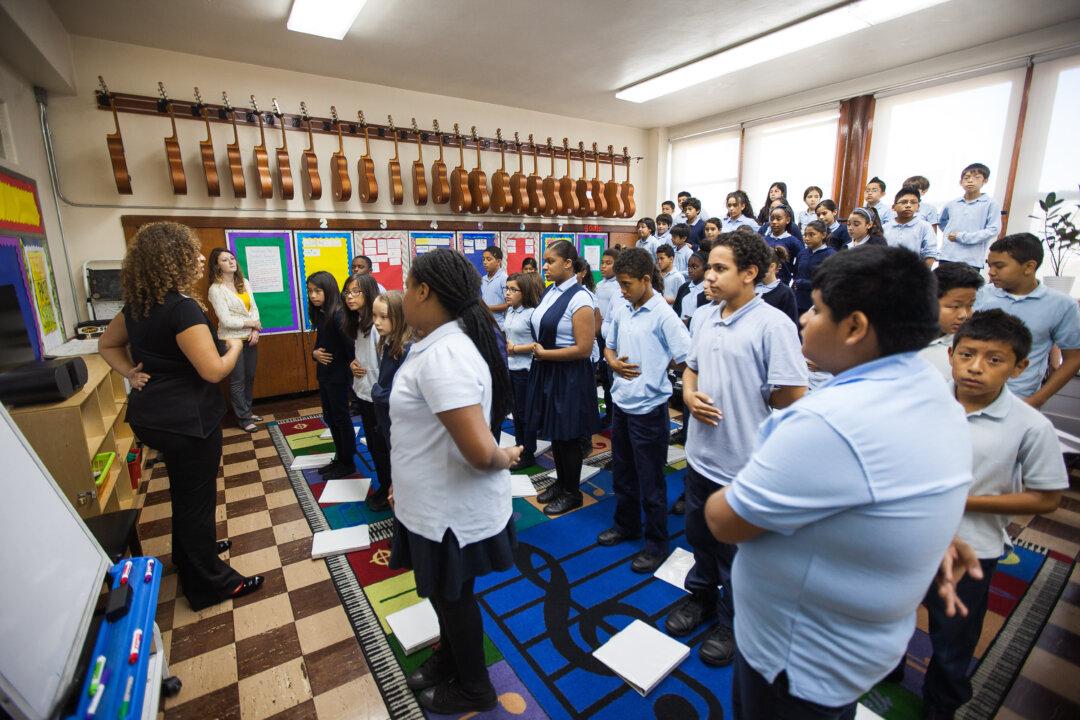NEW YORK—A lineup of seventh-graders looked at the corridor wall where the Voice Charter School of Corona, Queens, keeps the school’s values posted, looking to set goals for themselves.
Jordan Lynch Frazier picked the one about breaking through your limits: “Only those who will risk going far can possibly find how far they can go.”
“Each person has their own limits and we have to try to push on,” he explained. “If' we don’t, then we’re always going to be staying in the same place and we’re not going to have the sensation of success.”
School Chancellor Carmen Fariña, visiting the school on Thursday, asked Frazier what goal he was pushing for. “I guess to go to a competitive college,” the boy replied.
Yet make no mistake, Voice is hardly college-prep only, as the school’s forte is actually music.
About a decade ago, Franklin Headley, the Voice principal, used to be assistant principal at P.S. 131 in Jamaica, Queens. Children came to the school speaking 24 languages and so Headley took on classes in teaching English as a second language.
He was amazed by what he learned: “If you use music and movement, dance, you can accelerate language.” Even more interesting, students don’t even have to sing in English to get some of the benefits.
With a grant from New York University they brought in people who could sing with the students in their native languages and saw encouraging results: “Children did better, it was a more joyful place, [test] scores went up.”
Since then, Headley thought about building a school around this concept. Meanwhile, the east-side Manhattan St. Bartholomew’s Church, famous for it’s music performances, wanted to open a choir school.
The two got together and the Voice Charter School of New York was born.
When planning the school, Headley considered opening it as a regular district school. But he wanted to give teachers three free periods a day for lesson preparation. The only way to do that was to lengthen the school day but he couldn’t break teachers’ union contracts. The only way was to open Voice as a charter school.
The school went through a few rough years at the beginning but it now seems to have found its way, according to responses on school review sites Insideschools.org and Greatschools.org.
The day starts at 7:55 a.m. and ends at 4:30 p.m., but in return for the long hours the children can enjoy music lessons everyday and teachers have more prep time.
In addition, the music is not just an elective; it is part of the curriculum. Learning the songs improve literacy; explaining the lyrics boosts critical thinking; while reading music scores enhances math abilities, such as fractions. Daily choir practice promotes cooperation.
Values
Diana Acevedo, community coordinator of the school’s parent association, praised its emphasis on values. “You could be a great engineer, a great professional, whatever it is, but if you don’t have values in your life you’re not a complete human being,” she said. “You need that part, that spiritual part.”
Acevedo’s son, now in fifth grade, went through a rough patch in his first months of kindergarten, as the school, similar to many other charter schools, requires rather strict discipline. But she had no complaints. “I believe that good education has a structure,” she said.
Also, her son wasn’t much into singing at first, even though Acevedo is from a family of musicians. “At the beginning he was pretty resistant,” she said. But gradually he came along and now he plays piano and flute in class and started with guitar this year.






